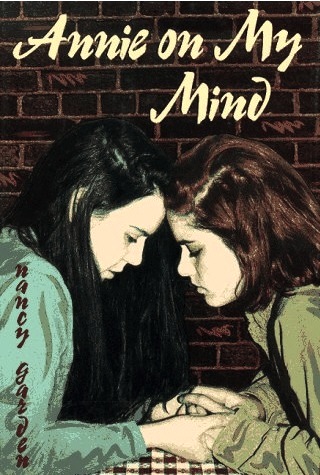LITERATURE aimed at teenagers has been around since the 1940s, but it really came into its own only in the 1970s. The popular and never out-of-print Annie on My Mind, published in 1982 by Farrar, Straus and Giroux, is well-known for its portrayal of teenage lesbian love, and it is one of the first gay or lesbian young adult novels to hold the promise of a happy ending. Its author, Nancy Garden, died of a heart attack on June 23, 2014, at her home in Carlisle, Massachusetts, at the age of 76.
Antoinette Elisabeth Garden (she changed her name to Nancy) was born in Boston and had planned to become an actress. After receiving a BFA from Columbia and working off-Broadway and in summer stock, she received a master’s in speech from Columbia Teacher’s College. She published her first books in 1971 and worked as a writer and editor for the rest of her life, going on to write about three dozen books for children, teens and adults, in a wide variety of genres. Garden also wrote two more lesbian-themed novels: Good Moon Rising (1996) and Holly’s Secret (2000).
But she made her name with Annie on My Mind. Growing up, she had been unable to find books that reflected her life

experience, only novels with lurid covers sold at drugstores or bus stations, books that ended unhappily for the gay or lesbian characters. This is the situation that she set out to rectify. Annie on My Mind is told in the voice of MIT freshman Liza, who reflects on her love affair with Annie during their senior year at separate high schools. Liza is one of two children in a professional, well-established family and attends a private high school in Brooklyn Heights; Annie is a native Californian, an Italian-American whose father drives a cab and whose multi-generational family lives in a tenement and attends a rough-and-tumble high school. They’d met by chance while visiting the Metropolitan Museum, fell in love, and carried out a discreet affair, aided by a fortuitous house-sitting gig during a school vacation.
The house, owned by closeted lesbian teachers, is the site of some of the most dramatic moments of the book. (The lesbian teachers, who are outed by some uptight parents, make the best of the fact that they are forced out of their jobs.) The girls, both of whom are close to their families, are inveterate museum-goers and readers, giving Garden the opportunity to mention several classic lesbian novels, such as Radclyffe Hall’s The Well of Loneliness (1928) and Isabelle Miller’s Patience and Sarah (1972). Liza and Annie struggle with their sexual identities, looking up the word “homosexuality” in the dictionary with much trepidation and purchasing “a couple of gay magazines and newspapers.”
In 2000, School Library Journal named Annie on My Mind to its list of 100 books that shaped the 20th century, and Garden received many book awards and honors. But Annie was also burned in Missouri and banned in a school library in Kansas. The book became the subject of a federal censorship case when a suit, supported by the ACLU and the American Library Association, resulted in a ruling that the removal of the book was unconstitutional, and it was returned to the library. Garden’s The Year They Burned the Books (1999) focuses on this event. In an on-line interview with writer Cynthia Leitich Smith, Garden is quoted as saying: “One teacher wrote me that he was sure Annie had kept one of his students from suicide—that’s perhaps the most moving comment of all.”
Nancy Garden is survived by Sandra Scott, with whom she was together for over forty years. The two were married in Massachusetts in 2004.




